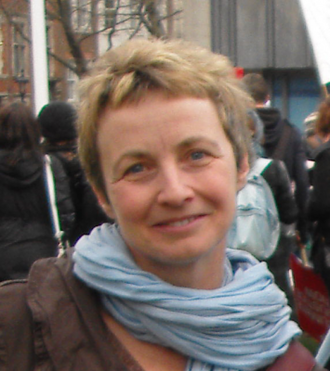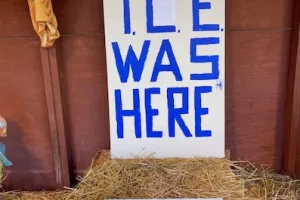Viewpoint: Catholic Bishops and the Environment

Catholic filmmaker, broadcaster, environmentalist and journalist, Mary Colwell writes: This month the Catholic bishops of England and Wales produced a statement from their plenary (twice-yearly meeting) called 'Stewardship of God's Creation'. I thought I would give my thoughts on it as someone now deeply immersed in the world of conservation and the protection of life on earth. Of course, this statement is very welcome and I applaud the bishops for their commitment to produce a fuller one later in the year. It is, therefore, timely to add your voice to this issue. As the National Justice and Peace Commission you represent the initiatives of the bishops' conference and have to be involved. I trust the bishops and the newly formed environmental committee will consult you all.
The first thing that struck me about this short statement is the tired phrase, Stewardship of Creation. Immediately it brings to mind a notion of hierarchy and management.
The Cambridge English Dictionary give this definition of stewardship:
Someone's stewardship of something is the way in which that person controls or organises it: The company has been very successful while it has been under the stewardship of Mr White.
The Oxford Dictionary is similar:
The job of supervising or taking care of something, such as an organization or property: 'the funding and stewardship of the NHS' or 'responsible stewardship of our public lands'.
In my opinion this is the wrong message delivered in the wrong language. I have no idea where 'stewardship of creation' comes from, it is not biblical, but it has been around for a long time. Stewardship is not a good word. There is no heart, no humility, no love in it. We are certainly not in control. We are not shop stewards of a factory floor, we are co-inhabitants of an astonishing planet that challenges and nurtures us and provides us with resources and wonderment. The earth and all its life forms are the source of our creativity and daily joy. We are not in charge of this planet, but we have a profound and holy responsibility towards it.
The statement then goes on to recognise "an unprecedented ecological crisis," which I hope embraces not only climate change but also the extinction of species. Yet again, however, the phrasing is cold and arm-wavy. I personally don't like the use of the word 'ecological'. Ecology is a field of study, like biology, theology, geology. We wouldn't say there is a biological crisis on earth, but there is certainly an environmental one. I do know that this phrase has slipped into common vernacular but it lacks a depth of understanding that comes from pondering and contemplation on the real meaning behind words.
Why am I being picky about language? Because language matters and words matter. We are acutely aware of the language people use. When the church says it is a steward or talks about ecology, that sets the tone for the discussion.
It is also lazy thinking. Simply presenting phrases someone else devised a long time ago gives the impression that this is the sum of things, that this phrase is the best way of expressing the situation and that nothing has moved on. Clichés are detrimental to progress. They are superficial and simply graze the surface, they bring no fresh thoughts or ideas. This is a great shame. We are in unprecedented times and we need a new language that expresses that urgency. Words matter. Expressed well, they bare our uncertainty and pain, desire and weakness, acceptance and humility. We can do well to learn from Greta Thunberg's eloquence and authenticity.
"It is still not too late to act. It will take a far-reaching vision, it will take courage, it will take fierce, fierce determination to act now, to lay the foundations where we may not know all the details about how to shape the ceiling. In other words, it will take cathedral thinking. I ask you to please wake up and make change possible."
And, yet again, David Attenborough strikes the perfect tone. He is a consummate and emotional storyteller who engages the heart as well as the mind. "We need", he said, "to fall in love again with the earth." Words matter.
It is true that everyone is both a storyteller and a lover of stories, it is how we communicate what is important to us. "Stories are just data with a soul" said the inspirational psychologist Brené Brown. Yes, indeed they are. Allow me to tell you one story about a visit I made recently to a nature reserve in Yorkshire.
The Lower Derwent Valley is a National Nature Reserve, an area of open grassland that floods in the winter and dries out in the summer months and provides soft soils, worms and insects for all kinds of life. The wetness of the soil has, so far, saved it from intensive agriculture and conurbation, although both of these press in all around. A hundred new houses are being built nearby and already the site is under increased pressure from dog walkers, light pollution and noise. On this calm spring morning, though, it was beautiful. A whitethroat sang in the bushes and sedge warblers were remarkably prominent as they caught insects for their young that were hidden somewhere in the low shrubs. My favourite sound, the bubbling soul-cry of the curlew, rang out in the distance.
I sat in a hide with the ranger and we watched 30 whimbrels feeding in long grass about 200 metres away. They are fabulous long-distance migrants that spend the winter in West Africa and breed in Iceland. Their average round trip is 16,000 miles and the fields of the reserve are a stop-over site, or avian service station, that provides food and safe refuge while they gain strength for the final leg of their journey. The birds used to feed in a wider area, in the agricultural land surrounding the reserve, but the continued drainage, intensification and development of the land, as well as increasingly dry weather, has made this very difficult. If this reserve were ever to be requisitioned, the birds would die. It was so sobering - this group of beautiful, tough, long distance travellers are now totally reliant on a couple of fields in a nature reserve in Yorkshire to survive. "You can set your calendar on the day they arrive, 99% of the time on April 19th, its incredible how they time things," said the ranger "but it also shows their vulnerability. They have to come here, there is nowhere else left."
The whimbrels had just flown in from west Africa where they spend the winter months. That part of the continent has seen a 5-fold increase in the human population level since 1950. Back then there were 73 million people but this is projected to exceed 1 billion by 2060. It is the fastest growing region in the world, and 40% of the population is Christian. It is also true that Africa is the future heartland of Catholicism. The number of baptized Catholics on the continent is growing at a significantly faster rate than anywhere else in the world.
What then for the whimbrels? They face increasing pressures from the spread of agriculture and development on their African wintering grounds, an increase in intensive agriculture and urbanisation in Yorkshire and accelerating climate change affecting their arctic breeding grounds in Iceland. All of these are related to the huge and embarrassing elephants in the room - population increase and rampant consumption, including a diet rich in meat and dairy. All of these difficult issues have to be addressed directly and honestly if any progress is to be made, but I wonder if there is the courage and conviction to do so. It will be painful to tease out what the Church can contribute, but there is no doubt that it has a lot to offer if it squarely faces the challenge.
Whimbrels, godwits, terns, ducks and geese, to name but a few world travellers, use the whole planet to live out their wild lives, they don't inhabit just one place. They tie the world together in great migratory flights and we are privileged to host them for just a few short weeks. The responsibility on us is huge. They are telling us an important story.
I hope the bishops' environmental committee recognises that nothing is seen in isolation, that England and Wales are not isolated from the rest of the world. A whimbrel may not be on the bishops' radar, but all wildlife tells us about the state of the planet. According to the devastating UN biodiversity report published on May 6th, we are in danger of losing 1 million species because of the way we are using the earth, especially for farming. We depend on the intricate web of life to keep ecosystems functioning to provide us with pollinators, fresh water, clean air and rich soils - to name but a few essential 'services'. It is also a terrible tragedy because we are losing the wellspring for so much that makes us human. Not to mention the fact that other life on earth has a right to exist too.
Catholicism is a global religion and in a prime position to address these global concerns. Arm waving statements about an ecological crisis and saving creation only go so far. The Church has 2000 years of truly beautiful and poetic wisdom to draw upon. It has profound insights into the meaning of human and other life on earth. It has the words of inspiring environmental writers like Thomas Merton and Thomas Berry. I hope that these will be drawn out in the summer environment paper. Now, more than ever, we need to be moved to action. We live on a planet that is connected by a web of life upon which we all depend, but there is little in the statement so far that even comes close to recognising this. However, we wait to see, and I wish the authors the very greatest of blessings as they write.
Republished with author's permission. This article was first published on Mary Colwell's website Curlew Media. See link below:


















